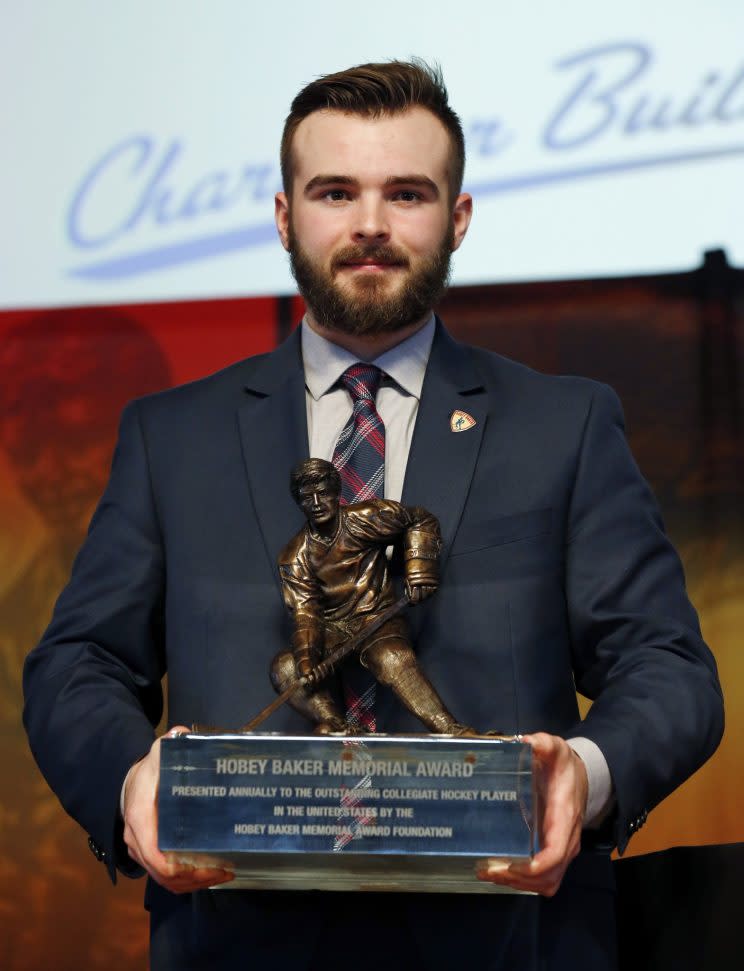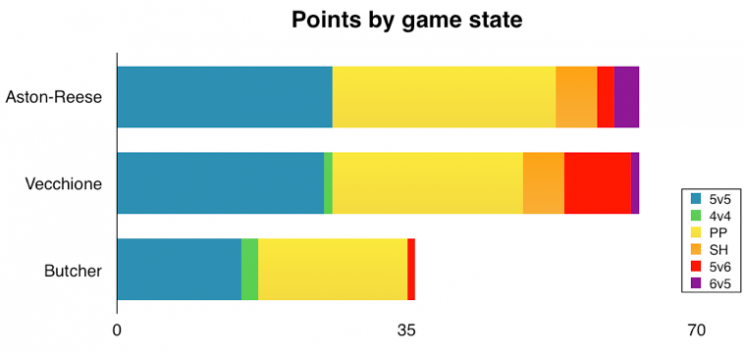University of Denver's Will Butcher wins 2017 Hobey Baker Award

Well, it actually happened.
Denver defenseman Will Butcher won the 2017 Hobey Baker award, despite some potential hurdles.
There was always the possibility that Butcher would consolidate the western bloc of voters, and for understandable reasons. At the same time, you had to acknowledge the very good chance Union’s Mike Vecchione and Northeastern’s Zach Aston-Reese would split the eastern voters to some degree.
[Follow Puck Daddy on social media: Twitter | Instagram | Facebook | Tumblr]
Butcher finished the regionals tied for second in points among defensemen nationally, and tied for fifth in points per game. But as with any No. 1 defender on an elite team, his quality extended well beyond his ability to produce goals.
While he certainly didn’t come close to the kind of production the forwards who also made the Hobey Hat trick put up (understandably, as a defenseman), he checks a lot of other Hobey boxes:
• Plays for a great team
• American
• Senior
• Leadership-y
• Good at defense
• Only 5-foot-10, so you know he works hard, folks!
Western voters largely seem to value things that aren’t necessarily quantifiable or directly attributable to individual performance. That’s how so many mediocre St. Cloud guys end up being Hobey finalists. So while Butcher is certainly deserving (for all the reasons I laid out earlier this week) whether he would actually win was very much up in the air.
But as the week went on, a general feeling among the college hockey media started to develop: Butcher probably had a better shot than some might have given him credit for at first blush, even a few weeks ago. Again, it’s easy to see why. Best player in the best conference, playing the best minutes for the team that was basically the best all season long.
Moreover, the fact that Hobey voting is done the after the regionals (which doesn’t really make sense, but whatever) and the Pioneers nuked the field in Cincinnati, winning a combined 11-5, made Butcher’s candidacy a little more robust.
[NCAA Frozen Four: Minnesota-Duluth beats Harvard with last-minute goal]
[NCAA Frozen Four: Denver annihilates Notre Dame; sets up all-NCHC final]
Though we’ll never know for sure, one imagines this was a close vote. There are clear arguments for and against each player, though the reasonability of each varies widely.
It’s worth noting there were weird biases at play here, pretty much across the board. With Aston-Reese, you had a guy who dominated the competition all year long but did so for a relatively weak team (insofar as it didn’t make the tournament or, indeed, even come close). Of course, that boils down to the Huskies’ horrid goaltending, but nonetheless they won a lot of games 5-4 and 4-3. Aston-Reese was the biggest reason why, scoring the most goals and points in the country, playing in all situations, and so on. Northeastern was flat-out dangerous with him on the ice, and that he played without either of his intended linemates for a big chunk of the season.
Regardless, voters love holding team lack of team success against star players (true in the NHL as well) so if you wanted to manufacture a reason why the nation’s leading points-per-game player didn’t deserve the award, that’s it.
The bias against Vecchione was, clearly, that he came from a weaker league. Better team? Sure, record-wise. But put Northeastern in the ECAC and the Huskies win a lot more than 18 games. And 18 ain’t a bad number. Vecchione had plenty going for him as a high-scoring senior on a good line for a team generally viewed as being defensively responsible, but voters — as they did last year for Kyle Connor — could have held the weakness of the conference in which he played against him. Not entirely fair, but understandable.
Vecchione finished tied for the national lead in points with Aston Reese in the same number of games, but the points breakdown clearly tips in the latter’s favor:

Aston-Reese had one extra point at 5-on-5 and four more on the power play, but Vecchione padded out his total with an NCAA-leading eight points on empty-net goals. Aston-Reese had only two. And he scored three points with his own goalie out, compared to Vecchione’s one. They had the same number of shorthanded points (five).
Moreover, while Vecchione finished eighth in the nation in assists per game (0.89 per) to Aston-Reese’s 11th-place 0.84, it’s also important to note that Vecchione had eight more secondary assists than he did primaries. Aston-Reese had 12 more primaries than secondaries.
Seen this way, Aston-Reese either scored or directly set up 53 of Northeastern’s 140 goals (38 percent). Vecchione only scored or set up 42 of Union’s 143 (29 percent).

As you can see, Butcher was clearly instrumental in the Pios’ power play success (he had a point on almost half of Denver’s extra-man goals) and made things happen at 5-on-5 as well, despite getting the toughest minutes coach Jim Montgomery could find for him. While there was concern that Butcher might get shortchanged because of his position, the case he made for himself in the final few weeks of the season was just too irresistible.
Denver’s Tanner Jaillet wins Mike Richter award as nation’s top goalie
Tanner Jaillet was also named the winner of the fourth annual Mike Richter award.
He had .930 save percentage and went 24-5-4 in 34 starts as of the time of the vote, just before the start of the NCAA tournament.
My thoughts on the award were spelled out pretty clearly a few weeks ago here. For my money, Williams was the only logical choice, having led the nation in both 5-on-5 and overall save percentages by a huge margin.
For the record, my Richter ballot looked like this:
1) Charles Williams, Canisius
2) Tanner Jaillet, Denver
3) Parker Gahagen, Army
4) Michael Bitzer, Bemidji State
5) Kyle Hayton, St. Lawrence
Neither Gahagen nor Hayton made the final five, with Hunter Miska and Cal Petersen (both of whom were on much better teams but turned in slightly less impressive seasons individually) swapping in for them.
Clayton Keller named national Rookie of the Year, All-American teams announced
Okay, let’s just get through some housekeeping with the some of the other awards.
BU’s Clayton Keller won the Tim Taylor national ROTY award, for scoring 45 points as a true freshman in just 31 games. He led all rookies in goals per game, points per game, shots per game, total shots on goal, and shorthanded goals. He was really good, and he’s already in the NHL now, with two assists in three games.
The other award to announce here is Wisconsin’s Aidan Cavallini winning the Derek Hines Unsung Hero award, having been a depth player for his first three seasons with the Badgers, and only scoring his first career goal on Dec. 9 this season. He scored five more the rest of the way, and voters felt he best highlights why sticking with it is cool and good.
Finally, here are the national All-American teams, 22 of whom were first-time nominees:
First Team East
G: Charles Williams, Canisius
D: Adam Fox, Harvard
D: Charlie McAvoy, BU
F: Zach Aston-Reese, Northeastern
F: Spencer Foo, Union
F: Mike Vecchione, Union
First Team West
G: Michael Bitzer, Bemidji
D: Will Butcher, Denver
D: Tucker Poolman, North Dakota
F: Henrik Borgström, Denver
F: Alex Iafallo, Minnesota-Duluth
F: Tyler Sheehy, Minnesota
Second Team East
G: Kyle Hayton, St. Lawrence
D: Gavin Bayreuther, St. Lawrence
D: Jake Wallman, Providence
D: Dylan Zink, UMass Lowell
F: Anders Bjork, Notre Dame
F: Tyler Kelleher, UNH
F: Alex Kerfoot, Harvard
(Yes there are three defensemen on this team. That’s not a misprint.)
Second Team West
G: Tanner Jaillet, Denver
D: Danny Brickley, Minnesota State
D: Luc Snuggerud, Nebraska-Omaha
F: Mason Jobst, Ohio State
F: Luke Kunin, Wisconsin
F: Austin Ortega, Nebraska-Omaha
St. Michael’s senior duo both win Hockey Humanitarian
Danny Divis and Justin McKenzie, both seniors at Div. 3 St. Michael’s, were honored as Hockey Humanitarians for starting a mental health awareness organization called Hope Happens Here after both lost loved ones to suicide early in life.
In addition, both work on their school’s Student-Athlete Advisory Committee to create a support network for kids at the college who need it.
You can read more about their work here. It’s really awesome and, as with every other Hockey Humanitarian winner, these are great kids.
Ryan Lambert is a Puck Daddy columnist and occasionally covers the NCAA for College Hockey News. His email is here and his Twitter is here.
MORE FROM YAHOO HOCKEY:

 Yahoo Sports
Yahoo Sports 

